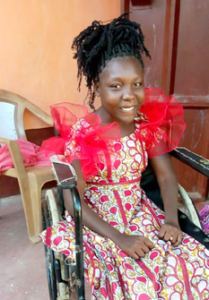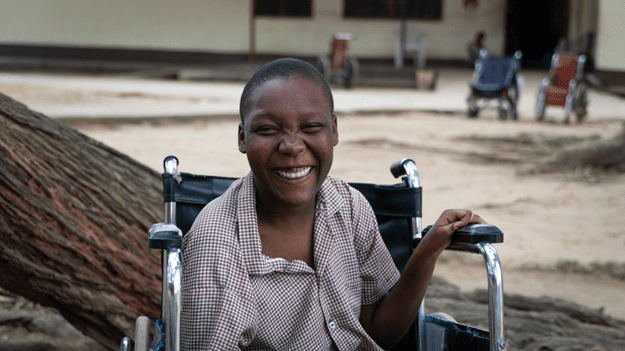Creating Possibilities: Living a Life of Achievement with Cerebral Palsy
by Lauren Blair
Posted on March 19, 2024
Many years ago, while volunteering in a classroom at the Gede Special School in Kenya, a particular student’s smile always stood out to me. Gladys was a little girl with cerebral palsy, a developmental disability that affected her movement, posture, and coordination. Her demeanor was warm but unassuming. At home, her parents would often comment on her humility and self-discipline. She was a child that would pray every morning and evening without fail. It would have been easy to overlook her since she was never disruptive. Yet today, fully grown, no one can dismiss her intelligence, hard work, and achievement–all of which defy local stigmas and beliefs about what someone is capable of with a disability like cerebral palsy.
The Barriers of Beliefs
In Glady’s community, disabilities are often believed to be the result of a curse or witchcraft, resulting in abuse, and, at times, murder of children with disabilities. Frequently, children with disabilities are not considered capable or worthy of receiving an education. Worldwide, 98% of children with disabilities are not enrolled in school.
While Gladys’ parents loved and accepted their daughter, they found it difficult to gain community-wide acceptance of her disability. Over the years, neighbors advised them to consult a traditional healer or look for a faith healing by a local pastor—anything to rid them of the “curse” of disability.
Support for Success

Gladys after completing secondary school
When Kupenda staff in Kenya met with Gladys and her family, however, they educated them about the medical causes of cerebral palsy, referred them to medical support, counseled them on their rights, and encouraged them to enroll Gladys in school.
With the help of a Kupenda supporter, Gladys was able to attend the Gede Special School where she was provided with a wheelchair, therapy, and the accessibility she needed to receive an education and thrive. Before long, Gladys was surrounded by friends and performing well academically–even through secondary school. Due to the friendships she formed with students who were deaf at her school, she also developed a skill for communicating in Kenyan Sign Language (KSL). When Gladys finished her education and took the national exams, her grades were strong—particularly in KSL. Her parents could not be more proud.
In her community, Kupenda staff is also working to foster a wider acceptance of disabilities. By hosting Disability Training Programs, staff educate community leaders about the medical causes of disability and support them in meeting the needs of those with disabilities around them.
Today, as Gladys embarks on her future, Kupenda staff is providing her with career guidance so that she can become as self-reliant as possible. Gladys herself reports that she has gained confidence from what she has achieved. Typical to her kind nature, however, she is quick to recognize that there are many other children who have not had the same opportunity to reach their potential.
Ambassadors for Awareness
This month is a particularly significant month for children with cerebral palsy like Gladys. March is National Cerebral Palsy Awareness Month, dedicated to cultivating awareness about causes, interventions, and support for the approximately 18 million people with cerebral palsy worldwide. Countless children like Gladys are simply waiting for the opportunity to demonstrate their own unique gifts to the world. Would you consider being a part of their success? Your support could open the door to their future!
Want to keep updated on Kupenda’s work?
Follow us on Facebook, Instagram, LinkedIn, TikTok, YouTube, and Twitter.
Learn more about Kupenda in our podcast.
Sign up for our newsletter.
Or sponsor a child in need for just $30 / month.




Leave a Reply